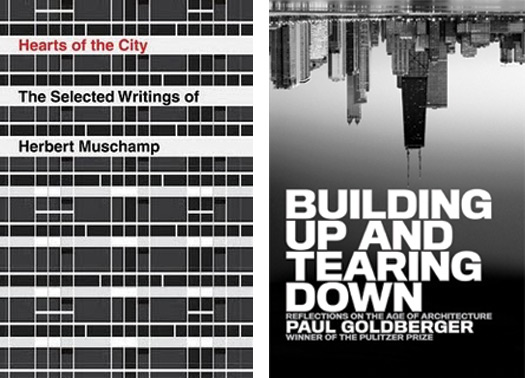
January 1, 2010
Criticizing the Critics

The two men who controlled the architectural conversation in New York (and hence America and the world) for better than two decades have recently published collections of their criticism. Paul Goldberger and Herbert Muschamp — how different their voices and predilections, and yet how confounding each could be in his own way. Goldberger: the voice of the establishment. Muschamp: the glamour-obsessed cosmopolitan. My final piece for ID magazine is a review of Building Up and Tearing Down, a collection of Goldberger’s recent writings primarily from the New Yorker. Goldberger makes for easy reading, a pleasant companion to the architectural scene, and he’s still going strong. Muschamp is gone now — he died of lung cancer in 2007—and it’s fair to say the architectural world is reduced by his absence, even if I was never a fan of either his opinions or his prose or his stewardship of the Times’s architectural coverage. Certainly, he made you pay attention, even if he set your eyes rolling. It’s hard to imagine a critic holding anywhere near the kind of power over the profession he wielded in his prime. The posthumous publication of his collected writings, Hearts of the City, makes for a good opportunity to think about his tenure, as I do in my review in the Los Angeles Times. Check ’em out.
Observed
View all
Observed
By Mark Lamster
Related Posts

Business
Courtney L. McCluney, PhD|Essays
Rest as reparations: reimagining how we invest in Black women entrepreneurs

Design Impact
Seher Anand|Essays
Food branding without borders: chai, culture, and the politics of packaging

Graphic Design
Sarah Gephart|Essays
A new alphabet for a shared lived experience

Arts + Culture
Nila Rezaei|Essays
“Dear mother, I made us a seat”: a Mother’s Day tribute to the women of Iran
Recent Posts
Candace Parker & Michael C. Bush on Purpose, Leadership and Meeting the MomentCourtney L. McCluney, PhD|Essays
Rest as reparations: reimagining how we invest in Black women entrepreneurs Food branding without borders: chai, culture, and the politics of packaging Why scaling back on equity is more than risky — it’s economically irresponsibleRelated Posts

Business
Courtney L. McCluney, PhD|Essays
Rest as reparations: reimagining how we invest in Black women entrepreneurs

Design Impact
Seher Anand|Essays
Food branding without borders: chai, culture, and the politics of packaging

Graphic Design
Sarah Gephart|Essays
A new alphabet for a shared lived experience

Arts + Culture
Nila Rezaei|Essays
